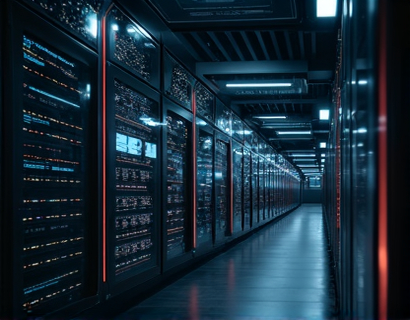Autonomous AI Agents: Revolutionizing Business Efficiency Through Multi-Chain and Cross-Technology Automation
In the rapidly evolving digital landscape, businesses are constantly seeking innovative solutions to enhance efficiency and productivity. One of the most transformative advancements in recent years is the emergence of autonomous AI agents. These intelligent systems are designed to operate independently across multiple blockchains and technologies, automating complex tasks and optimizing workflows. This article explores how autonomous AI agents are revolutionizing business efficiency, the benefits they offer, and their potential to reshape the future of work.
Understanding Autonomous AI Agents
Autonomous AI agents are software programs that utilize artificial intelligence to perform tasks without human intervention. They are capable of learning from their environment, making decisions, and executing actions based on predefined parameters. These agents can operate across various platforms, including different blockchain networks, enabling them to interact with diverse technologies seamlessly.
The core functionality of autonomous AI agents lies in their ability to analyze data, recognize patterns, and adapt to changing conditions. This adaptability allows them to optimize processes, reduce errors, and enhance overall efficiency. As businesses increasingly adopt digital solutions, the demand for such intelligent agents is on the rise.
The Role of Multi-Chain and Cross-Technology Automation
Multi-chain and cross-technology automation refers to the capability of autonomous AI agents to operate across different blockchain networks and integrate with various technological systems. This feature is crucial for businesses that rely on multiple platforms for their operations. By leveraging multi-chain capabilities, these agents can facilitate seamless communication and data exchange between disparate systems, leading to improved efficiency and reduced operational silos.
For instance, a business that utilizes both Ethereum and Hyperledger blockchains can benefit from autonomous AI agents that can interact with both networks. This interaction allows for the automation of processes such as transaction verification, data reconciliation, and compliance monitoring, all of which can be executed without manual intervention.
Benefits of Autonomous AI Agents for Businesses
1. Enhanced Efficiency
One of the primary advantages of autonomous AI agents is their ability to enhance operational efficiency. By automating repetitive and time-consuming tasks, businesses can free up valuable human resources to focus on more strategic initiatives. This shift not only improves productivity but also reduces the likelihood of errors associated with manual processes.
2. Cost Reduction
Implementing autonomous AI agents can lead to significant cost savings for businesses. By streamlining operations and reducing the need for manual labor, companies can lower their operational expenses. Additionally, the increased efficiency gained from automation can lead to faster project completion times, further contributing to cost reduction.
3. Improved Decision-Making
Autonomous AI agents are equipped with advanced data analytics capabilities, allowing them to process vast amounts of information quickly. This capability enables businesses to make informed decisions based on real-time data insights. By leveraging these insights, organizations can identify trends, forecast outcomes, and optimize their strategies accordingly.
4. Scalability
As businesses grow, their operational needs often become more complex. Autonomous AI agents provide the scalability required to manage increased workloads without compromising efficiency. These agents can easily adapt to changing demands, allowing businesses to scale their operations seamlessly.
5. Enhanced Customer Experience
In today’s competitive market, providing an exceptional customer experience is paramount. Autonomous AI agents can help businesses achieve this by automating customer interactions, personalizing services, and providing timely responses to inquiries. This level of responsiveness can significantly enhance customer satisfaction and loyalty.
Use Cases of Autonomous AI Agents in Business
1. Supply Chain Management
In supply chain management, autonomous AI agents can optimize inventory management, track shipments, and predict demand fluctuations. By automating these processes, businesses can reduce delays, minimize stockouts, and improve overall supply chain efficiency.
2. Financial Services
In the financial sector, autonomous AI agents can facilitate transaction processing, fraud detection, and compliance monitoring. By automating these tasks, financial institutions can enhance security, reduce operational risks, and ensure regulatory compliance.
3. Marketing Automation
Autonomous AI agents can revolutionize marketing efforts by automating campaign management, customer segmentation, and performance analysis. This automation allows businesses to deliver targeted marketing messages, optimize ad spend, and improve return on investment.
4. Human Resources
In human resources, autonomous AI agents can streamline recruitment processes, manage employee onboarding, and monitor employee performance. By automating these tasks, HR departments can focus on strategic initiatives that drive organizational growth.
Challenges and Considerations
While the benefits of autonomous AI agents are significant, businesses must also consider the challenges associated with their implementation. One of the primary concerns is data security. As these agents operate across multiple blockchains and technologies, ensuring the security of sensitive data is paramount. Businesses must implement robust security measures to protect against potential breaches.
Another consideration is the need for proper integration with existing systems. Businesses must ensure that autonomous AI agents can seamlessly interact with their current technology stack. This may require investment in infrastructure and training to ensure a smooth transition.
The Future of Autonomous AI Agents
The future of autonomous AI agents looks promising, with advancements in artificial intelligence and blockchain technology paving the way for even greater capabilities. As these technologies continue to evolve, businesses can expect to see more sophisticated agents that can handle increasingly complex tasks and operate in more dynamic environments.
Moreover, the integration of machine learning and natural language processing will enable autonomous AI agents to understand and respond to human interactions more effectively. This advancement will further enhance their ability to automate customer service, support, and other interactive processes.
Conclusion
Autonomous AI agents are revolutionizing business efficiency by providing innovative solutions for multi-chain and cross-technology automation. By automating complex tasks and optimizing workflows, these intelligent systems empower businesses to maximize productivity and gain a competitive edge in the digital landscape. As organizations continue to embrace digital transformation, the adoption of autonomous AI agents will play a crucial role in shaping the future of work, driving efficiency, and enabling businesses to thrive in an increasingly competitive environment.










































